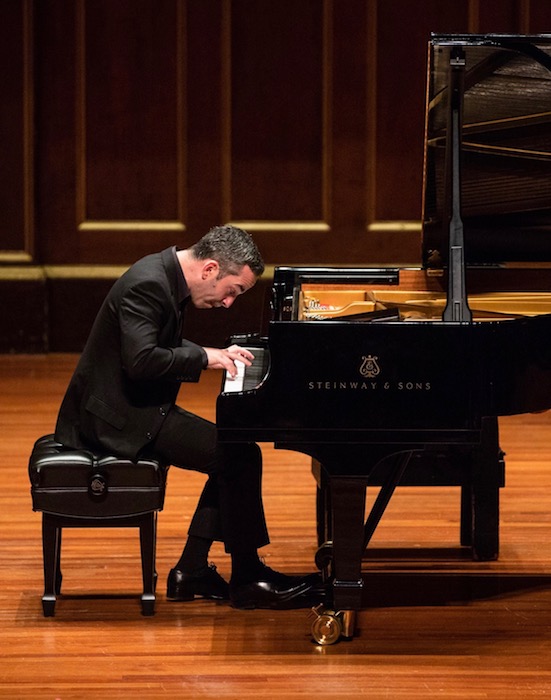Barnatan brings fresh virtuosity to the suite for the Celebrity Series

Inon Barnatan performed Sunday at Jordan Hall for the Celebrity Series of Boston. Photo: Robert Torres
For his Celebrity Series of Boston recital on Sunday afternoon, pianist Inon Barnatan assembled excerpts from several instrumental suites and theme-with-variation works into his own variation on the form.
A mainstay of the Baroque era, the instrumental suite was ubiquitous then, falling out of favor soon after. But this program showed the affinity that composers from the Baroque to the modern era had for the spirit if not the exact structure of instrumental suites. In performance at Jordan Hall, Barnatan held everything together through technical control and force of musical personality.
He eased into the improvisatory fugues of Bach’s Toccata in E Minor with restraint and lucidity. His more incisive approach towards the end of the toccata segued into the edgy feel and forward momentum that Barnatan gave to the graceful Allemande from Handel’s Suite in E Major. Barnatan’s powerful left hand also magnified the sheer melodicism of Handel’s counterpoint. The Courante from Rameau’s Suite in A Minor sustained the air of elegance, with Barnatan shaping the composer’s thick chords around questioning pauses.
Barnatan favored brisk tempos and firm agogics, especially in phrase endings, for most of the performance. François Couperin’s “L’Atalante” depicts an excited hero, yet Barnatan’s supercharged reading might have frightened — and impressed — Couperin’s refined patrons at the court of Louis XIV. The Rigaudon from Le Tombeau de Couperin, Ravel’s homage to French Baroque music, kept things fleet with its own neoclassical sheen. These two works showed the occasional tendency for some of Barnatan’s highest, fastest passages to blur. Some listeners may also have also preferred a lighter touch, but Barnatan’s aggressive articulation brought out the snap of Ravel’s syncopations.
By contrast, contemporary composer Thomas Adès’s Blanca Variations inspired smooth, spacious balances from Barnatan. He stressed the dissonances of this sad, poignant work for an eerily abstract reading.
Adès’s piece faded into the unrelenting quarter notes of György Ligeti’s Musica Ricercata 11, the final work from Ligeti’s set based upon a pre-fugal form. Barnatan let its brooding chromaticism do most of the work, adding dynamic inflections to emphasize shifts in register. Sticking with Ligeti, Barnatan clearly relished the jittery tone clusters, bitter humor and manic energy. These laid the groundwork for breakneck speed and pinpoint harmonic swerves in the fugue from Samuel Barber’s Piano Sonata in E-Flat Minor. Legendary pianist Vladimir Horowitz had asked the composer to add this fugue as a “flashy finale,” and it did the same job here before intermission.
Brahms’s Variations and Fugue on a Theme by Handel filled the second half of the recital. Never losing sight of his source material, Brahms uses Handel’s simple aria to explore melodic embellishment, textural contrasts, rhythmic displacements, degrees of dissonance, contrasting emotions and the sweep of his compositional ingenuity. The lengthy solo remains unified under the composer’s invention through twenty-five variations, an apt foil to the bevy of composers in the concert’s first half.
The work’s focus may have accounted for Barnatan’s comparatively relaxed approach. He effortlessly brought out the inner voices of the flowing second variation. The sixth variation’s canons sang with a charming legato. Crisp percussive effects enlivened the marching seventh variation, and variation 15 featured brassy chords. Barnatan’s pedal work in variation 21 created a shimmering effect in the grace notes while he let the music box of variation 22 simply chime away. The pianist explored tension and lightness in the concluding fugue, starting out with a slightly top-heavy feel, expanding into the gravity of Brahm’s voicings and then into a grand, foot-tapping conclusion.
After the closing applause, Barnatan gave a gentle and beautiful encore with Egon Petri’s piano transcription of Bach’s aria “Sheep May Safely Graze,” another example of musical tribute. Barnatan’s clever program and passionate, personal interpretations allowed listeners unfamiliar to these works to hear something new, and familiar listeners to listen in a fresh context.
Celebrity Series and Castle of our Skins present works by black composers, performed by the Dorchester Stringfest with the Conservatory Lab Charter School, 3 p.m. Saturday, Dec. 1 at the Kroc Center in Dorchester. 617-482-2595, celebrityseries.org, castleskins.org
Posted in Performances



